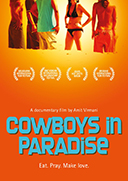 |
||||
| Still from Cowboys in Paradise (Amit Virmani, 2009). Used with permission from Amit Virmani. | ||||
|
||||
Journal Issue 3.2
Fall 2011
Edited by Julie Ann Salthouse, Jillian Hernandez, Agatha Beins, Karen Alexander and Deanna Utroske
Editorial Assistants: A.J. Barks and Anna Zailik
Cowboys in Paradise. 2009. Directed by Amit Virmani. Singapore: Coup Communications. 82 minutes.
Reviewed by Adeline Koh
Cowboys in Paradise is an entertaining yet serious documentary on the male sex trade in Bali, Indonesia. In this film, director Amit Virmani chronicles the lives of the "Kuta Cowboys," the tanned, attractive young men who hang out at the beaches and offer "love affairs" to Western women travelers. The film explores the reality and complexity of this burgeoning sex trade, bolstered by popular travel narratives like Eat, Pray, Love that seduce readers with romanticized images of a faraway East. This topic--the female-driven male sex trade in developing countries--has been also explored in the Haitian context in Laurent Cantet's film Heading South (Vers le Sud), originally a novel by Dany Laferriere.
Cowboys documents the possible paths these love affairs can take. Often, the women travelers will develop long-distance relationships with their Cowboys and return frequently to Bali to continue their affairs. The relationships sometimes progress to marriage, and the women take their Cowboys with them to their home countries. But the marriages often end in failure, as the typical "beach boy" does not have enough education to get a well-paying job in his European or American wife's home country, and experiences culture shock in the new, foreign environment. The film also draws attention to the hidden side of some Cowboys' lives: the Balinese wives that many "Cowboys" maintain while working as "beach boys." The position of these Balinese wives vis-a-vis their husbands' jobs is difficult. In one moving scene, a Balinese wife narrates that she sleeps in a different room when her husband's "guests" visit. She insists that she does not mind his line of work because it is safer and more profitable than industries like construction and fishing. But the scene is filmed with pathos, showing that her dependence on this profession is difficult and painful.
Intelligent, fast-moving, humorous, and sad, the 82-minute documentary calls attention to the critique of second-wave feminism by minority and international feminists such as bell hooks, Chandra Mohanty, and Trinh T. Minh-ha: despite the common condition of being women, the same battles are not fought by women of privilege and their poorer counterparts. This harsh reality is illustrated by the poignant vignettes that draw the perspectives of the female tourists, the Balinese wives, and the Cowboys themselves into sharp contrast.
Cowboys in Paradise is an excellent film for courses on feminist theory, the history of feminism, and classes on postcolonial studies. I used Cowboys in a senior-level capstone class for the Women, Gender and Sexuality Studies program at Richard Stockton College in the spring of 2011. Students watched both Eat, Pray, Love and Cowboys in Paradise after reading second-wave feminist theory alongside its critique by minority and postcolonial feminists. Because they viewed Cowboys after reading theory, students were able to accurately identify the urgency of the inequality raised by minority and postcolonial feminists in their critique of feminisms of privilege. Students reported that watching Cowboys brought the reality of the theoretical texts into sharp relief, and was the most important learning moment in the course. Links to course materials, and a student-led interview with director Amit Virmani, can be found on the Stockton Asian Film Series website.1
1 Many of the teaching resources that I used are on the Stockton Asian Film Series website (http://wp.stockton.edu/asianfilmseries). This includes a student-led presentation on forms of Orientalism today in films like Eat, Pray, Love and Sex in the City (http://wp.stockton.edu/asianfilmseries/2011/04/01/orientalism-today-a-student-led -discussion/). A student-led interview with Amit Virmani, director of Cowboys in Paradise, is available at http://wp.stockton.edu/ asianfilmseries/2011/04/06/
an-interview-with-amit-virmani/.
Copyright © 2008. All rights reserved.